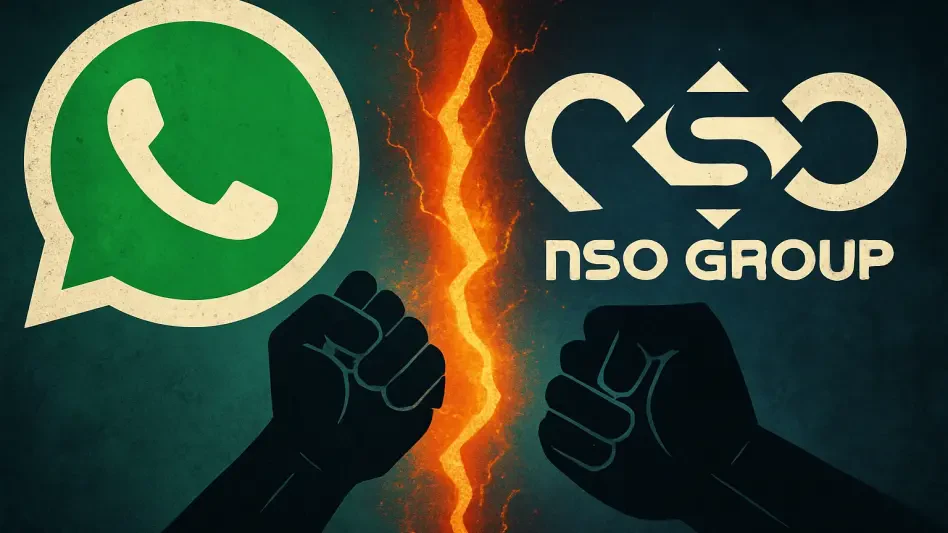In a digital era where privacy breaches can shatter trust overnight, a recent legal victory has spotlighted the ongoing war against invasive surveillance tools, with WhatsApp, the widely used messaging platform under Meta’s umbrella, emerging triumphant against NSO Group, a notorious commercial spyware developer. This landmark ruling, finalized last year, marks a significant turning point in the battle for user data protection, as it not only penalizes NSO for exploiting vulnerabilities in WhatsApp’s systems but also imposes a permanent ban on their access to the platform. The case, spanning over half a decade, has gripped the tech and legal communities alike, raising critical questions about the accountability of spyware vendors and the responsibility of tech giants to safeguard user information. As cyber threats grow more sophisticated, this decision serves as a beacon of hope for those advocating stricter regulations on surveillance technologies, while also highlighting the persistent challenges in securing digital ecosystems against malicious actors.
Unveiling the Breach and Legal Fight
The origins of this high-profile legal clash trace back to 2019 when WhatsApp uncovered a severe breach in its systems, orchestrated by NSO Group through its infamous Pegasus spyware. This malicious software exploited a vulnerability, known as CVE-2019-3568, which allowed remote code execution via targeted phone calls, infecting around 1,400 devices worldwide, including those of journalists, activists, and government officials. Such unauthorized access enabled the spyware to harvest sensitive data without user consent, posing a grave threat to privacy and security. WhatsApp swiftly responded by filing a lawsuit against NSO, alleging violations of user trust and contractual terms through the misuse of the platform’s servers. This legal action underscored a broader concern about the unchecked power of commercial spyware firms, whose tools often target vulnerable populations and high-profile individuals, amplifying the risks to both personal freedoms and national security in an increasingly connected world.
Beyond the initial discovery, the legal battle revealed deeper systemic issues as WhatsApp accused NSO of contravening key statutes like the Computer Fraud and Abuse Act (CFAA) and the California Comprehensive Computer Data Access and Fraud Act (CDAFA). The lawsuit painted a stark picture of deliberate exploitation, with NSO’s actions not only breaching technical barriers but also eroding the foundational trust users place in messaging platforms for secure communication. Throughout the proceedings, WhatsApp argued that the reputational damage and loss of user confidence were irreparable, pushing for stringent penalties to deter similar misconduct by other entities. The case also brought to light the sophisticated nature of Pegasus, capable of operating covertly while extracting vast amounts of personal data, a reminder of how advanced cyber weapons can undermine even the most robust digital defenses if vulnerabilities are left unaddressed or exploited for profit by unethical actors.
Court Rulings and Their Impact
As the legal proceedings unfolded, a pivotal moment arrived in 2024 when a US District Court judge found NSO liable for hacking into WhatsApp users’ devices, marking a significant affirmation of the platform’s claims. Initially, a jury awarded WhatsApp substantial compensatory and punitive damages, though these figures were later adjusted by Judge Phyllis J. Hamilton on October 17 of that year to a reduced punitive amount of $4 million. More crucially, the court upheld a permanent injunction prohibiting NSO from targeting WhatsApp users, reverse-engineering the platform’s code, or retaining any related source material. This ruling was grounded in the recognition of direct harm caused to both WhatsApp and its global user base, rejecting NSO’s defense that it had any inherent right to exploit the platform for its business purposes. Such a decision sent a powerful message about the judiciary’s stance on protecting digital privacy over commercial interests in the spyware market.
The implications of this injunction extend far beyond the immediate parties involved, as it sets a legal precedent that could influence future cases against spyware vendors. Cybersecurity experts, including voices from organizations like Citizen Lab, have hailed the ruling as a potential game-changer, suggesting that it diminishes the market value of tools like Pegasus by restricting their operational scope. WhatsApp’s leadership also celebrated the outcome as a victory for civil society, emphasizing that it reinforces the accountability of tech firms in curbing malicious cyber activities. However, NSO’s appeal efforts to lessen the damages and lift the ban highlight the tension between business viability and ethical responsibility, a debate that continues to shape policy discussions. This case underscores the urgent need for tech companies to bolster their defenses while advocating for laws that penalize the misuse of digital platforms, ensuring that user safety remains paramount in an era of escalating cyber threats.
Broader Implications for Cybersecurity
This legal outcome illuminates a growing consensus on the necessity to regulate commercial spyware, which often operates in a gray area of legality, exploiting gaps in digital security for profit. The WhatsApp-NSO case serves as a stark reminder of how such tools can jeopardize not only individual privacy but also national security when wielded against influential figures or critical infrastructure. By securing a ban on NSO’s activities related to its platform, WhatsApp has contributed to a broader movement pushing for accountability in the spyware industry, where unchecked proliferation of surveillance technologies has long gone unaddressed. This ruling may encourage other tech giants to pursue similar legal actions, fostering a collective effort to establish norms that prioritize data protection over exploitative business models, while also prompting governments to reevaluate policies surrounding the export and use of cyber weapons.
Looking ahead, the decision also raises questions about the future of cybersecurity strategies as digital platforms face increasingly sophisticated attacks from state-sponsored and private actors alike. The permanent injunction against NSO, which includes mandates to destroy any associated source code, signals a shift toward harsher penalties for privacy violations, potentially deterring other firms from engaging in similar practices. Yet, the challenge remains in balancing innovation with security, as vulnerabilities like the one exploited by Pegasus can emerge even in well-protected systems. Stakeholders across the tech sector must now focus on collaborative efforts to enhance encryption, patch weaknesses proactively, and advocate for international frameworks that curb the misuse of spyware. As this case has shown, legal victories are vital, but sustained vigilance and policy reform will be key to safeguarding user trust in an ever-evolving digital landscape.
Reflecting on a Pivotal Moment
Reflecting on the events that transpired, the legal clash between WhatsApp and NSO Group stands as a defining chapter in the fight against invasive cyber tools, with the court’s ruling last year delivering a resounding blow to unchecked surveillance practices. The decision to impose a permanent ban and financial penalties on NSO underscored the judiciary’s commitment to upholding privacy rights, even in the face of complex technological challenges. This outcome not only validated WhatsApp’s relentless pursuit of justice for its users but also exposed the vulnerabilities inherent in digital platforms that malicious entities readily exploit. Moving forward, the tech industry must seize this momentum to push for stronger safeguards, urging lawmakers to enact comprehensive regulations that prevent the proliferation of spyware. By investing in robust security measures and fostering global cooperation, companies can build a fortified digital future where user data remains protected against emerging threats.








